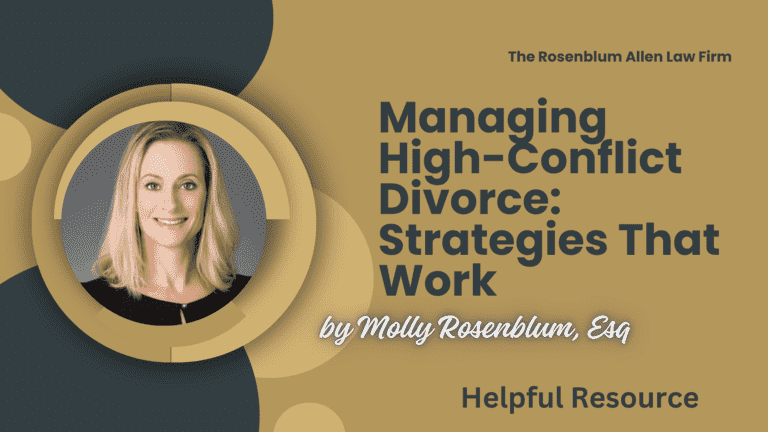Navigating the Storm: A Comprehensive Guide to High-Conflict Divorce
Divorce is hard, but when it comes to a high-conflict divorce, it feels like you’re in the middle of a big storm.
This guide will help you understand a high-conflict divorce, why it happens, and how it affects everyone involved.
You’re not alone, and knowing what to expect can make things easier.

Understanding High-Conflict Divorce
Definition of High-Conflict Divorce
A high-conflict divorce is more than two people deciding to split up. It’s like a tug-of-war with solid emotions and disagreements that don’t stop. These kinds of divorces are tricky because they involve a lot of anger and arguing, and they can take longer to settle than other divorces.
Common Characteristics and Behaviors
If you’re in a high-conflict divorce, you might see some of these things happening:
- Lots of yelling or fighting
- Trouble agreeing on even small things
- One or both people might say mean things or lie
- It’s hard to work together on anything
Legal and Emotional Definitions
Legally, a high-conflict divorce doesn’t have a special meaning—it’s still a divorce. But emotionally, it feels different. It’s a divorce where feelings are super intense, and the usual way of settling things doesn’t work.

Causes of High-Conflict Divorce
Personality Disorders and Psychological Issues
Money can be a big reason for fights in a high-conflict divorce. Who gets what and how much money one person should pay the other can be huge disagreements.
Child Custody Battles
When kids are involved, things get even more complicated. Parents might disagree on who the kids should live with or how they should be raised.
Past Incidents of Abuse or Neglect
If there was ever abuse or neglect in the relationship, that can make the divorce more difficult. It brings up a lot of bad feelings and can make it hard to agree on anything.
Infidelity and Trust Issues
If one person isn’t faithful, or if there are significant trust issues, that can turn a divorce into a high conflict. It’s like adding fuel to the fire of all those disagreements.
Impact of High-Conflict Divorce
Effects on Children and Co-Parenting
Kids feel this kind of divorce a lot. They can get caught in the middle, which is hard on them. It can also make it challenging to figure out how to work together as parents after the divorce.
Emotional Toll on Both Parties
High-conflict divorces can drain your emotions like nothing else. You might feel sad, angry, or even scared about what will happen.
Financial and Legal Consequences
These divorces can also hurt your wallet. They often take more time, which means more money spent on legal fees. And the outcomes can differ from what you might expect in a more peaceful divorce.
Legal Aspects of High-Conflict Divorce
Role of Attorneys in High-Conflict Cases
When dealing with a high-conflict divorce, having a lawyer is like having a guide in a tricky maze. They know the paths to take and the traps to avoid. Your attorney will stand up for you and make sure your voice is heard, especially when things get heated.
Understanding Restraining Orders and Legal Protection
Sometimes, you might need to keep yourself safe. That’s where restraining orders come into play. They are like a shield, telling the other person they can’t go too close or they’ll get in trouble with the law. Your lawyer can help you get one if you need it.
The Court's Approach to High-Conflict Situations
Courts know that high-conflict divorces are tough. They try to make fair decisions and keep everyone, especially kids, safe. They might order extra counseling or put special rules in place to ensure things don’t get out of hand.
Importance of Documentation and Evidence
Think of documentation and evidence like pieces of a puzzle. They show the court what’s going on. Keep track of messages, emails, and other essential papers. They can help show your side of the story.
Strategies for Managing High-Conflict Divorce
Communication Techniques for High Conflict Situations
Talking during a high-conflict divorce can be like walking on eggshells. But there are ways to make it a bit easier:
- Use “I” statements, like “I feel” or “I think,” so the other person doesn’t feel attacked.
- Try to stay calm, even if the other person isn’t.
- Sometimes, writing things down is better than talking.

Setting Boundaries and Protecting Emotional Health
Your feelings are important and need to be looked after. Set clear limits on what you will and won’t accept from the other person. This helps you stay strong and keep your cool.
Choosing the Right Lawyer for a High-Conflict Divorce
Not all lawyers are the same. Some are like knights who are good at defending their clients in tough battles. Look for an attorney with experience with high-conflict cases who makes you feel like they understand your situation.
Alternative Dispute Resolution vs. Court Battles
Court can be like the last level in a video game – it’s tough to get through. Sometimes, you can solve things outside of court through mediation or arbitration. These are ways to talk things out and agree without having a judge decide for you.

Supporting Yourself Through a High-Conflict Divorce
Seeking Support from Therapists and Support Groups
Going through a high-conflict divorce can feel lonely, but you’re not alone. Talking to a therapist or joining a support group can be like finding a team who’s got your back. They can give you advice, listen to what you’re going through, and remind you that you’re stronger than you think.
Self-Care Strategies and Stress Management
Taking care of yourself is vital. Ensure you’re eating right, sleeping enough, and doing things you enjoy. It’s like putting on your oxygen mask first – it helps you stay vital for everything else you need to do.
Resources for Legal and Emotional Support
There are places you can turn to for help with the legal and emotional side of things. Look for community centers, legal aid, or counseling services that understand what you’re going through and can offer the help you need.

Preparing for the Future
Post-Divorce Life Planning
When you’re in the middle of a high-conflict divorce, it can be challenging to think about the future. But imagine it’s like planning a big trip. You need to know where you’re going and what you’ll need when you get there. Start thinking about your life after divorce—where you’ll live, your budget, and how you’ll spend your time. Like any big adventure, it helps to have a plan.
Co-Parenting Strategies After High-Conflict Divorce
If you have kids, you’ll need to figure out how to work with your ex to raise them. This can be tricky after a high-conflict divorce. It’s like doing a three-legged race—you must move together, even if it’s awkward. Here are some tips:
- Try to keep conversations about the kids and not old arguments.
- Use a shared calendar for the kids’ schedules to avoid confusion.
- Sometimes, talking through a third person, like a counselor or mediator, can help.
Building a Positive Environment for Children Post-Divorce
Your kids need a happy and safe place to call home. You can help create that by:
- Keeping things as normal as possible.
- Making sure they know the divorce isn’t their fault.
- Let them talk about their feelings and listen to what they say.
Why You Haven't Hired a Las Vegas Divorce Attorney Yet
Watch this short video to take the next big step toward getting divorced.

Breaking It All Down for You
High-conflict divorces are tough, but you can get through them. Remember:
- Stay calm and choose your battles.
- Get a good lawyer who knows about high-conflict cases.
- Protect yourself and your feelings.
- Plan for the future and take care of your kids.
Encouragement and Advice for Moving Forward
You might feel like you’re climbing a huge mountain right now, but every step you take is one step closer to the top. Soon, you’ll be looking back at how far you’ve come. You’ve got this! Take it one day at a time, find people who can help you, and don’t forget to take care of yourself. Your new life awaits you on the other side of this storm.

Frequently Asked Questions
What should I do if my ex-partner spreads lies about me during the divorce?
If your ex is spreading falsehoods, document each instance and share it with your lawyer. They can use this information to defend you and correct the record.
How can I communicate effectively with my ex if every conversation turns into an argument?
Consider using written communication like texts or emails. Keep topics clear, maintain a neutral tone, and stick to facts, especially regarding the kids or divorce logistics.
Can a high-conflict divorce affect my job?
Stress from divorce can impact your work. Talk to your HR or supervisor for support or flexibility during this tough time.
How do I handle co-parenting during the divorce process?
Establish an interim plan for sharing responsibilities and time with the kids. Use a third-party communication service if direct communication is difficult.
What if my ex refuses to follow the court’s orders?
Document each instance and report it to your attorney. They can bring it back to court for enforcement, potentially leading to penalties or fines.
How can I help my children adjust to the changes after the divorce?
Keep routines consistent, be open to their questions, reassure them of your love, and seek professional help if needed.
Is it normal to feel overwhelmed during a high-conflict divorce?
Yes, feeling overwhelmed is normal. Take time to rest, seek support from friends, family, or professionals, and prioritize self-care.
What if I can’t afford a lawyer for a high-conflict divorce?
Look into legal aid societies or pro bono programs. Some lawyers offer sliding scale fees. Legal guidance is crucial, so explore all available options.
How can I protect my privacy during a high-conflict divorce?
Be mindful of social media posts, change passwords, and secure personal data. Maintain privacy against a spouse who may seek information to use against you.
Should I move out of the marital home during a high-conflict divorce?
Decide carefully as it can affect divorce proceedings and custody. Consult your lawyer before making a decision.
How long does a high-conflict divorce typically take?
Duration varies based on complexity, disagreement level, and legal system efficiency. Prepare for a longer process than a typical divorce.
How can I stay healthy and manage stress during this time?
Prioritize self-care with nutritious food, exercise, and sleep. Practice mindfulness and maintain social connections and enjoyable activities.

Glossary
High-Conflict Divorce: A type of divorce characterized by ongoing hostility, lack of cooperation, and aggressive behavior between the parties involved.
Attorneys: Legal professionals representing and advising clients in various matters, including divorce.
Restraining Order: A legal order issued by a court to protect an individual from being harmed or harassed by another person.
Legal Protection: Measures and actions taken to ensure an individual’s legal rights are upheld and protected from illegal activities by others.
Documentation: The collecting, maintaining, and recording of all relevant information and evidence that may be used in legal proceedings.
Evidence: Information presented in a legal case that is used to prove or disprove facts in the dispute.
Communication Techniques: Methods and strategies used to convey messages effectively, especially in potentially contentious situations.
Boundaries: Limits set on behaviors or interactions to protect an individual’s emotional and physical well-being.
Emotional Health: A person’s psychological and emotional state influences their well-being.
Alternative Dispute Resolution (ADR): A range of processes, such as mediation or arbitration, that allow parties to resolve disputes without litigation.
Mediation: A form of alternative dispute resolution where a neutral third party helps the disputing individuals reach a mutually acceptable agreement.
Arbitration: A process in which a neutral third party makes a binding decision to resolve a dispute between two or more parties.
Support Groups: Groups of people who provide each other with encouragement, comfort, and advice on personal issues, such as going through a divorce.
Self-Care: Practices and activities undertaken by an individual to enhance their health and well-being.
Legal Aid: Legal services are provided at no or low cost to individuals who cannot afford a lawyer.
Co-Parenting: Sharing the duties and responsibilities of parenting between two individuals who are no longer romantically involved.
Post-Divorce Life: The phase of an individual’s life after the legal termination of their marriage.
Positive Environment: A supportive and nurturing setting that promotes well-being and growth, essential for children after their parents’ divorce.
By understanding these terms, you can better navigate the complexities of a high-conflict divorce and the legal system.
Additional Resources for You

Here are some resources created by our lead attorney, Molly Rosenblum Allen, Esq, to help our readers in their time of need:
- Information about hiring a divorce attorney in Las Vegas.
- Resources and guidance related to divorce in Nevada.
- Tips and support for individuals going through a divorce.
What Happens If You Don’t Sign Divorce Papers
- Explains the implications of not signing divorce papers.
Do I Need an Attorney to Get a Divorce
- Information on whether you need an attorney for a divorce.
What is a Collaborative Divorce
- Defines and explains collaborative divorce as an option.
- Tips on how to navigate and potentially win a divorce case.
Switching Lawyers During Divorce
- Information on changing legal representation during divorce proceedings.
How Long Does a Divorce Take in Nevada
- Insights into the timeline of divorce proceedings in Nevada.
Questions to Ask a Divorce Lawyer
- A list of important questions to ask when consulting a divorce lawyer.
These resources cover various aspects of divorce and legal matters, providing valuable information and support to individuals facing divorce-related challenges.

Offsite Resources You May Find Helpful
If you seek additional information and resources related to divorce, annulment, and family law, the following offsite resources may be invaluable:
American Academy of Matrimonial Lawyers (AAML): A leading association providing resources and professionals skilled in the field of family law.
National Association of Divorce Professionals (NADP): A network of professionals from various fields who specialize in services for those going through divorce.
Legal Information Institute (LII): A research and electronic access tool from Cornell Law School providing access to a vast array of legal information and documents.
National Parents Organization (NPO): An organization focused on promoting shared parenting and ensuring the well-being of children.
WomensLaw.org: A resource offering legal information and support to women and others dealing with domestic violence and family law issues.
American Bar Association (ABA) – Family Law Section: The ABA provides resources on family law, including articles and information about legal processes.
These resources provide a variety of information that can help individuals understand their rights, the legal process, and find support during the difficult time of divorce or separation.

A Special Message From Our Lead Attorney
Why You Might Need a Lawyer
Molly Rosenblum, Esq

Dear Reader,
Thank you for taking the time to explore the divorce resources we’ve carefully curated for you. We understand that the journey through divorce or annulment is deeply personal and often challenging. We aim to provide you with the necessary tools and knowledge to navigate this complex process.
If you need further guidance or are ready to take the following steps toward resolving your situation, please don’t hesitate to reach out. At The Rosenblum Allen Law Firm, my team and I are committed to offering compassionate and skilled legal representation to protect your interests.
Call us at (702) 433-2889 to discuss how we can assist you. We are here to support you through each phase of your case and help you confidently move forward.
Warm regards,
Molly Rosenblum, Esq.




